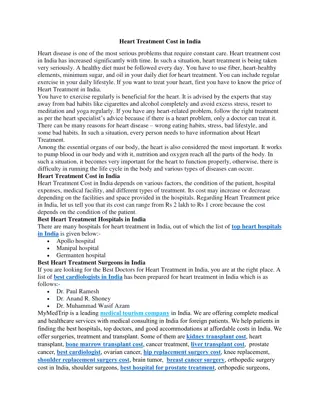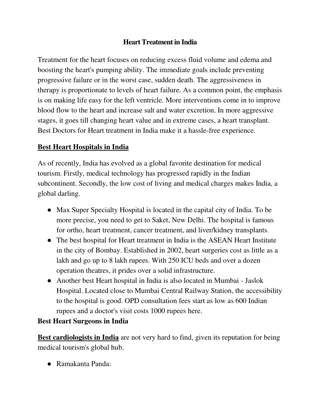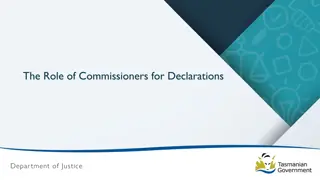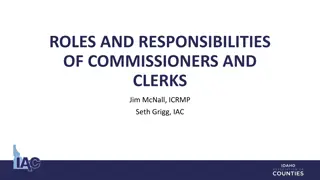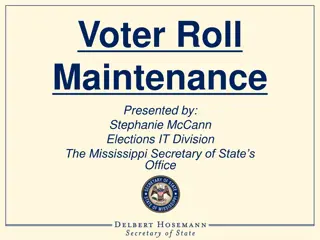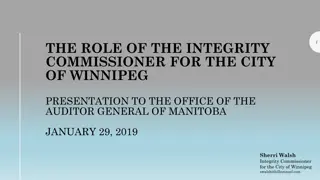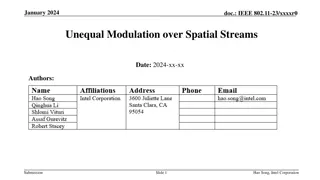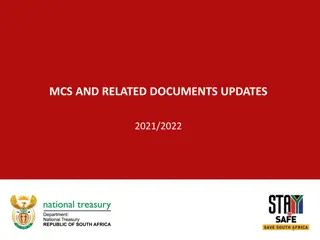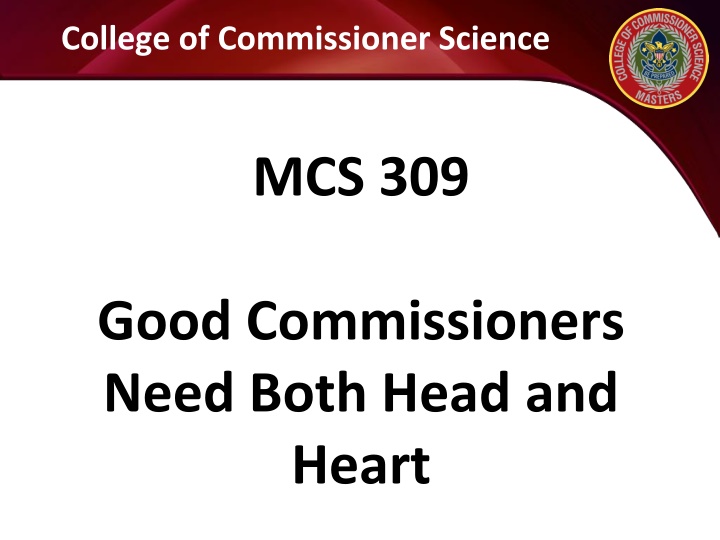
Essential Insights into Commissioner Role in Unit Leadership
Dive into the crucial aspects of being a good commissioner, emphasizing the importance of leveraging both head and heart in fostering effective communication, networking, and support with unit leaders. Explore key strategies, objectives, and tools essential for successful commissioner engagement in unit development within the Boy Scouts of America framework.
Download Presentation

Please find below an Image/Link to download the presentation.
The content on the website is provided AS IS for your information and personal use only. It may not be sold, licensed, or shared on other websites without obtaining consent from the author. If you encounter any issues during the download, it is possible that the publisher has removed the file from their server.
You are allowed to download the files provided on this website for personal or commercial use, subject to the condition that they are used lawfully. All files are the property of their respective owners.
The content on the website is provided AS IS for your information and personal use only. It may not be sold, licensed, or shared on other websites without obtaining consent from the author.
E N D
Presentation Transcript
College of Commissioner Science MCS 309 Good Commissioners Need Both Head and Heart
College of Commissioner Science MCS 309 Instructor: Wick Smith E-mail: smithwmw@gmail.com Mount Diablo Silverado Council Assistant Council Commissioner Council Dean
Course Objectives Understand the role of a Commissioner relative to the unit s leadership Understand the need to engage units in a guided discovery process to identify unit needs Provide communication skills to work effectively with units
Commissioner Role with Unit Commissioners work with the unit s leadership. Who?
Commissioner Role with Unit Commissioners work with the Unit s Leadership. Who? All of the unit s leadership: Chartered organization representative or institutional head Committee chair Unit leader (cubmaster, scoutmaster, Advisor, Skipper, etc.) Other leaders assistants, committee members, etc.
Commissioner Role with Unit Networking is Key! Get to know leaders outside of the unit that can be a Resource. Who? District and Council Leadership National BSA Leaders and their online outreach Community Leaders Local Government Leaders School Principals and teachers
Commissioner vs. Unit Leader Roles While Commissioners work closely with the unit key 3, we are there to support ALL unit leaders. Commissioners need to let unit leaders run their units as they see fit, but within policies and procedures of the Boy Scouts of America Our role is to guide and assist, not direct or run the unit s program. We observe, and note areas for improvement
The Tools You Will Need Communication and Training are your best Tools for serving your unit Learn How to communicate with your leaders. - E-mail, Text, Phone, Instagram, Websites, Snail Mail all have their place, but face to face is always best. - Do they like to hear from you at noon, in the evening, before or after a meeting? - Track what works do they respond to newsletters or ignore them? - Is there a communicator in your unit that is able to get the word out for you?
The Tools You Will Need Communication and Training are your best Tools Training is important for Unit Leaders - Many unit problems could have been avoided if people are trained - Training makes people feel more confident in their roles - Training keeps people from stepping on other leaders toes and also empowering the youth leaders - Training is important for Commissioners too!
Engaging Unit Leadership Its about attitude and approach It s not about you. Is the help you are offering helpful to the unit? What is your approach in working with the unit? Are you there to assist the unit with their needs, or as a representative from the District or Council? What is the flow of energy between you and your unit?
Commissioners and Guided Discovery Sometimes we are asked for help. Sometimes we observe problems or concerns? How do you help when you identify a problem?
An Example Your unit, which has been around for ten years, and regularly attended summer camp, has not attended summer camp for the last two summers. Why? There are a number of reasons behind this situation. What could they be?
An Example Scouts were not aware of the summer camp opportunity Leaders or parents were unable to take time to participate The unit does not have an active outdoor program The unit elected to do their own summer camp experience. The unit chose to utilize an out-of- council camp experience.
Effective Commissioner Service Understand the challenges your unit leaders face. Help leaders discover and understand the challenges they face, rather than telling them what they are. Investigate to understand the reasons units are not succeeding. Sometimes, the issue you observe is the result of a different problem. Communicate with leaders in ways that leaders want.
Effective Commissioner Service Make unit leaders feel effective and successful in their roles. Deliver on what you promise. Acknowledge your own mistakes and shortcomings.
Effective Commissioner Service Knowledge is power, and it should be shared. Freely share your knowledge it should not be a commodity
Unit Culture We need to understand the unit we are serving: What resources are available to that unit? Members, money, etc. What are the socio-economic conditions affecting that unit? What are the ages and experience levels of the Scouts within the unit? What Scouting experiences has that unit had? What resources are available to that unit?
Unit Culture Commissioners need to recognize the difference between doing something wrong, versus doing something different. Units may do things for very particular reasons. Different leaders have different approaches on achieving goals and accomplishing tasks. We need to recognize and support those approaches if they don t violate Scouting policy.
Scenarios 1. At the Troop Committee Meeting your unit announces it wants to play Laser Tag. 1. A parent contacts you because their Scout is being bullied and he feels the troop is not doing anything about it. 1. Your unit shows a slide show from their recent backpacking trip where they are cliff diving at a lake.
Course Summary You should now: Understand the role of a commissioner relative to the unit s leadership; Understand the need to engage units in a guided discovery process to identify unit needs; and Develop communication skills to work effectively with units
Leadership Traits L Loyalty E Empathy A Accountability D Duty and Determination E Energy and Encouragement R Respect S Selflessness H Honorable and Humble I Integrity and Innovation P Passion for and Pride in Work




